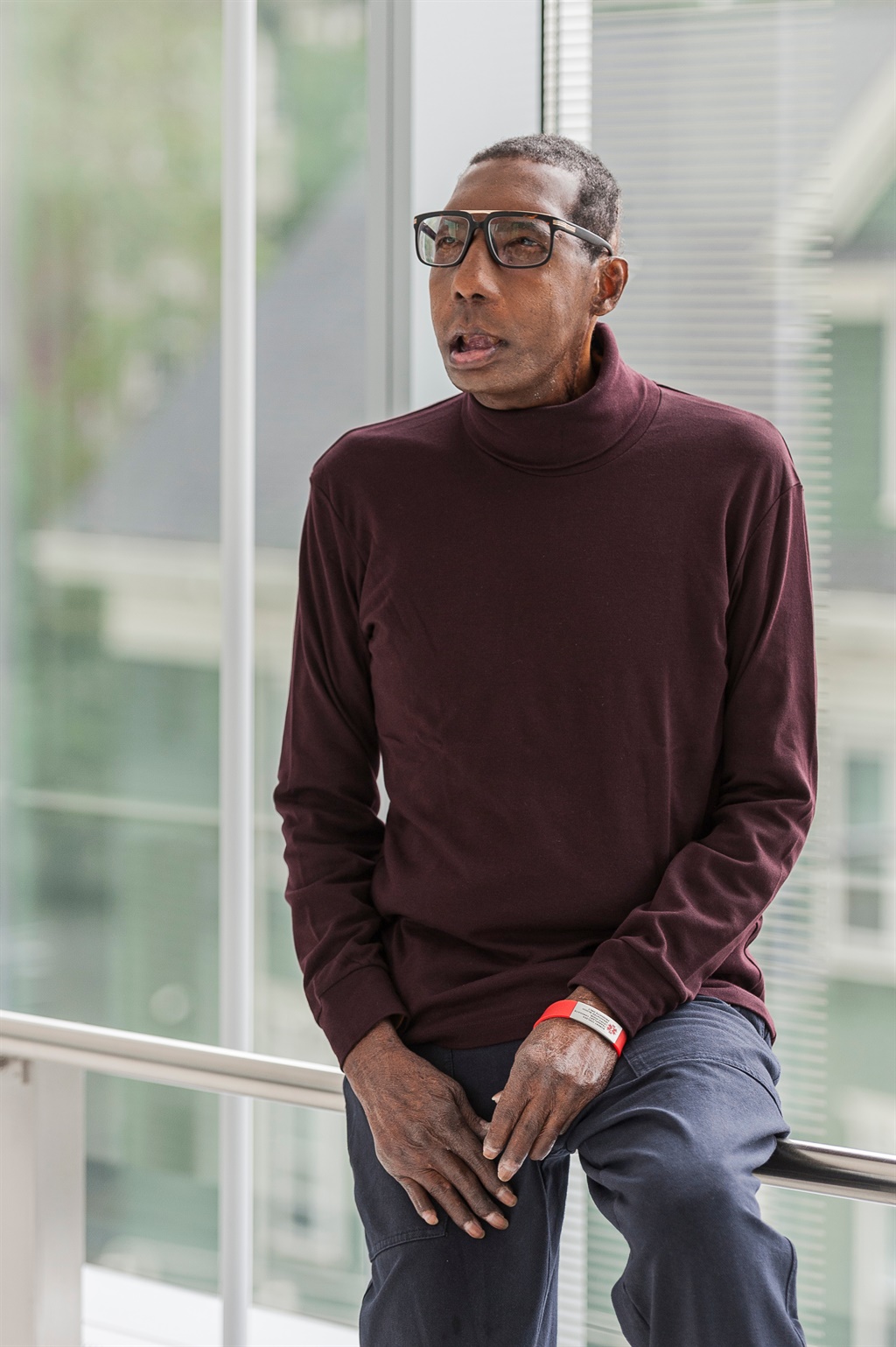
He was remarkably upbeat about not having a face and didn’t even mind when people gawked at him. “They’re just curious,” Robert Chelsea would say. “It’s scary it’s like I’m wearing a Halloween mask.”
But those days are over now for the 68-year-old from Victorville in California. Robert made history recently when he was revealed as the first African American to receive a face transplant. He’s also the oldest person to undergo the complex and ultimately life-changing surgery.
For Robert, a new face will mean a whole new lease of life. A catastrophic car crash six years ago left him brutally scarred and because he had no lips his day-to-day existence was very hard.
Eating was a major operation: food had to be liquidised and he’d squirt it into the back of his throat with a syringe then tilt his head back to prevent it from spilling out of his mouth. His exposed teeth put him at risk of gum disease and tooth loss.
Complications had also robbed him of two-thirds of his intestines and several fingertips. It’s safe to say Robert went through hell yet he claims losing his face didn’t really bother him. “I was never a knockout looker,” he said, although family photos show a handsome man with kind eyes and a warm smile.
He credited his Christian faith with helping him cope with a trauma that would be devastating to most people. In fact, when his doctors told him he’d been approved for a face transplant, he wasn’t even sure he wanted one. His health had been “reasonably good”
since recovering from the crash, he figured, and if he agreed to the transplant he’d be in and out of hospitals and doctor’s rooms for years to come.
He would also have to take immune system suppressing medication for the rest of his life to prevent his body from rejecting the new face.
But the more he thought about it, the more he realised there were things that would make a new face worth the trouble. He’d be able to eat normally again and be capable of closing his mouth properly.
Most importantly he’d be able to give his daughter, Ebony, a kiss on the cheek. And for Robert, that possibility made it worth the risk. Robert’s life changed in an instant when a drunk driver smashed into his car in 2013.
His vehicle exploded in a fireball and Robert sustained third-degree burns on almost half his body. He was barely conscious for the four months he spent in hospital and he had 18 operations, including skin grafts for his burns and abdominal surgery to treat serious gastrointestinal complications.
A side effect of the blood pressure drugs he took was that it moved blood away from his extremities, leading to tissue death in his lips, nose and fingers.
As he grew stronger doctors urged him to go on the transplant list but also warned it would be a long wait for a new face as the odds were heavily stacked against him. America has few black organ donors of any kind: in 2015 just 17% of African Americans who needed an organ transplant received one, compared to 30% of white patients.
An added complication with face transplants is matching skin tone. “Unlike internal organs, the skin tone of the donor is important to finding a match,” said Alexandra Glazier, president and CEO of America’s New England on or Services.
“It is vitally important for individuals of all races and ethnicities to consider organ donation, including the donation of external grafts, such as face and hands.”
Some donors were a match for Robert in other ways, including blood type and tissue type, but not in skin tone.
He could’ve had a transplant in May last year but because the donor was white, Robert said no. “I couldn’t bear the thought of becoming a totally different-looking person. Then a man known only as Adrian died.
Adrian, a 62-year-old construction worker, athlete and guitarist, died suddenly in July this year 18 months after Robert’s doctors told him he’d been approved for a face transplant.
Robert and Adrian never met and lived in different parts of the country, but their lives were about to become inextricably intertwined. And it was just the way Adrian would’ve wanted it.
“Adrian would give the shirt off his back for anybody,” his brother James said when his family agreed to the Gift of Life donor programme’s request for his brother’s organs and face to be donated.
At that stage James had no idea his brother’s face would be the first black face ever to be transplanted all he knew was Adrian was a perfect match for Robert and the skin tone was almost identical.
The surgery would be performed at the Brigham and Women’s Hospital in Boston, Massachusetts, a world leader in face-transplant procedures.
Robert’s transplant took 16 hours and involved more than 45 doctors and nurses who worked in two teams one to lift muscle, lips, ears, nose and skin from Adrian to Robert and the other to remove Robert’s damaged skin and muscle.
Both teams then worked together to implant the new facial tissue and connect arteries, veins, nerves and muscles. The surgery was hailed as a resounding success. Robert’s godson, Everick Brown, was fixated on one thing when his godfather emerged from theatre. “I was like, ‘Look at those juicy lips.
He’s going to be so happy’.” Robert looked “shockingly similar” to how he looked before the car crash, Everick added. “He came out with a beautiful face it was such a joy. This was the first time in my life I used the word ‘miracle’.”
Robert recovered quickly from the complex surgery and was eating, talking and breathing on his own less than two weeks later.
Studies of previous facial transplant recipients suggest he’s likely to regain close to normal sensation in his face and about 60% of his motor function within a year, including the ability to eat, smile and speak normally.
“So far, Robert has had no major setbacks and continues to progress well,” said Dr Bohdan Pomahac, who led the facial-transplant surgery. “We were honoured we were able to help Robert, who is a wonderful person.” Robert is grateful to Adrian’s family for allowing him to be a donor and would like to meet them someday. “Losing a loved one and being asked something like this.
I can’t imagine,” he told Time magazine. “I do feel hopeful that I can pick up some of the pieces the family may have lost.” He is also encouraging people, especially African Americans, to become organ donors so “other people can also have the chance of living a normal life”.
Pomahac said Robert’s new nerve-rich lips may never regain full function but as far as Robert is concerned, that’s okay. One of these days he’ll be able to kiss his daughter on the cheek – and that makes everything worthwhile.


















